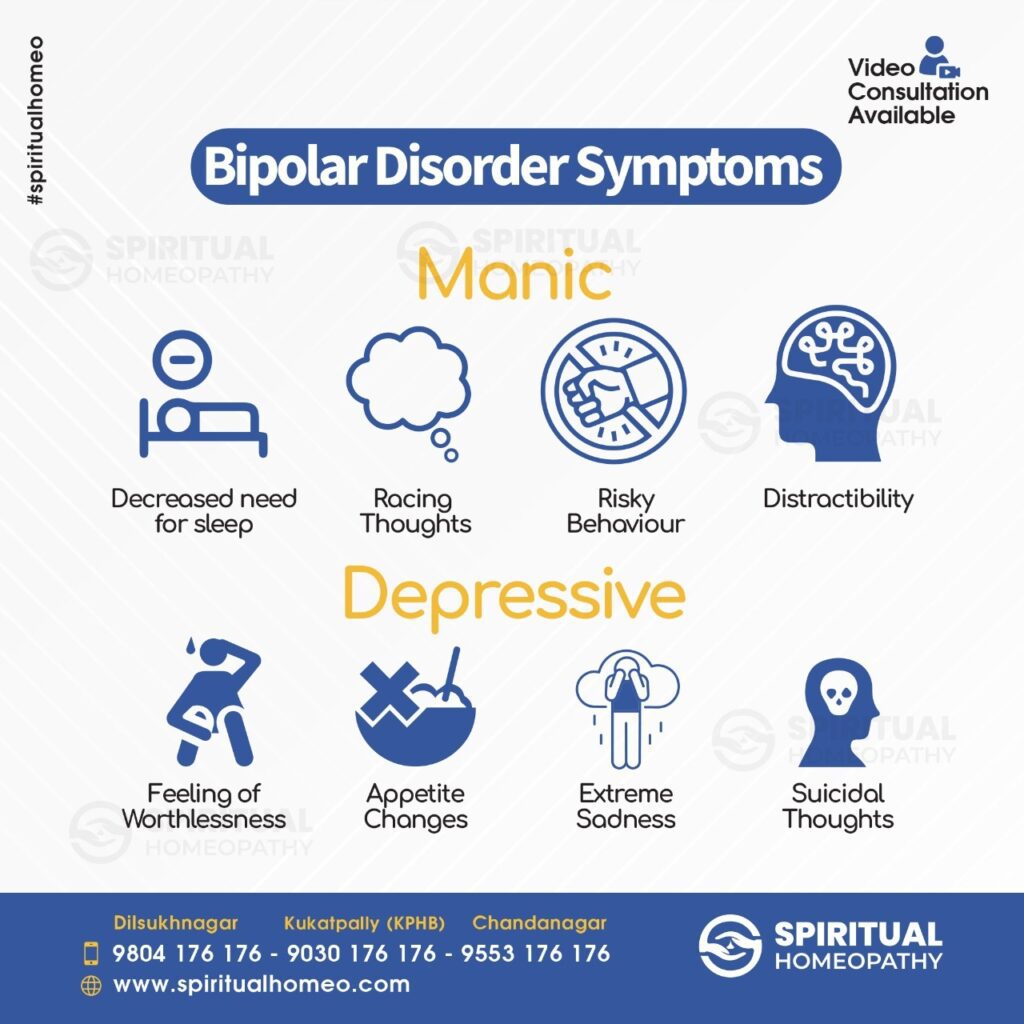Bipolar disorder, previously known as manic depression, is a mood disorder characterized by extreme shifts in mood and energy levels. Individuals with bipolar disorder experience periods of intense euphoria and energy (mania or hypomania) and periods of profound sadness or hopelessness (depression). These mood swings can disrupt daily life and functioning. There are several types of bipolar disorder, including Bipolar I, Bipolar II, and Cyclothymic Disorder. Here are the common symptoms associated with bipolar disorder:
Symptoms of Mania:
-
Elevated Mood: During manic episodes, individuals often experience an abnormally elevated or irritable mood. They may feel euphoric, excessively happy, or “on top of the world.”
-
Increased Energy: Manic episodes are characterized by heightened energy levels. People with bipolar disorder may feel restless and have a decreased need for sleep.
-
Rapid Speech: Speech can become rapid, pressured, and difficult to interrupt. Individuals may talk excessively and jump from topic to topic.
-
Racing Thoughts: Thoughts may race, making it difficult to concentrate or stay focused on tasks.
-
Grandiose Ideas: People with mania may have inflated self-esteem and grandiose beliefs about their abilities, accomplishments, or importance.
-
Risk-Taking Behavior: Impulsivity and poor judgment can lead to risky behaviors, such as reckless driving, spending sprees, substance abuse, or risky sexual behavior.
-
Decreased Inhibitions: Individuals may act without considering consequences, leading to socially inappropriate or confrontational behavior.
Symptoms of Depression:
-
Low Mood: Depressive episodes are characterized by persistent sadness, hopelessness, and a low or irritable mood.
-
Fatigue: People with bipolar disorder may experience overwhelming fatigue, low energy, and a lack of interest or pleasure in activities they once enjoyed.
-
Sleep Disturbances: Depression can lead to changes in sleep patterns, including insomnia or excessive sleeping.
-
Changes in Appetite and Weight: Depressive episodes may lead to changes in appetite, resulting in weight loss or gain.
-
Feelings of Guilt or Worthlessness: Individuals may experience excessive guilt, feelings of worthlessness, or self-criticism.
-
Difficulty Concentrating: Depressive episodes can impair concentration and memory, making it challenging to focus on tasks or make decisions.
-
Suicidal Thoughts: In severe cases, individuals with bipolar depression may have suicidal thoughts or engage in self-harming behaviors.
Cycling Between Mania and Depression: One of the hallmark features of bipolar disorder is the cycling between manic and depressive episodes. The frequency and intensity of these episodes can vary from person to person. Some individuals experience rapid mood swings, while others have longer periods of stability between episodes.
It’s important to note that bipolar disorder is a complex condition, and symptoms can vary widely among individuals. The diagnosis and management of bipolar disorder typically require the expertise of mental health professionals, such as psychiatrists and therapists. Treatment often includes homeopathic medications, psychotherapy (such as cognitive-behavioral therapy), and lifestyle changes to help individuals manage their symptoms and achieve stability in mood and daily functioning. Early diagnosis and appropriate treatment are essential for improving the quality of life for individuals with bipolar disorder.




